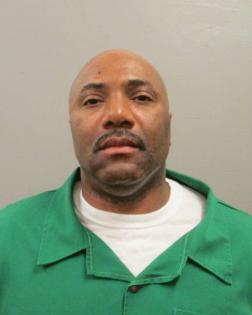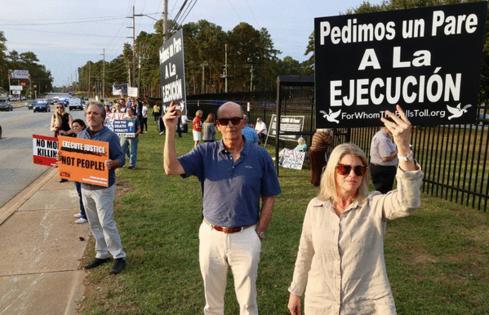Over pleas for mercy, South Carolina executes Richard Moore by lethal injection
Published in News & Features
COLUMBIA, S.C. — Richard Moore was executed Friday by lethal injection for the murder of James Mahoney, a Spartanburg County store clerk. Moore, 59, is the second person executed in South Carolina in just more than a month after a 13-year pause.
Moore’s death sentence was carried out at 6:24 p.m. Eastern time Friday over pleas for mercy from three of the jurors who convicted him, the judge who sentenced him and the former head of the South Carolina Department of Corrections who came to know Moore while he was on death row.
Moore is believed to be the only person in the history of South Carolina’s death penalty executed for an armed robbery who did not bring the fatal weapon to the scene. And he is thought to be the last to have been sentenced to die by a jury where all the Black jurors had been removed.
In a rare dissent to a 2022 opinion upholding his sentence, former South Carolina Supreme Court Justice Kaye Hearn called Moore’s sentence “disproportionate,” his conviction by a nearly all-white jury a “relic of a bygone era” and proof “that our system of capital punishment is broken.”
But hope for Moore faded this week after the U.S. Supreme Court declined to stay his execution to hear arguments on whether Black jurors had been improperly removed. A petition for clemency bearing over 50,000 signatures did not sway South Carolina Gov. Henry McMaster, who said that he decided against clemency after reviewing the case and speaking with Mahoney’s family.
Moore’s execution by lethal injection began at 6:01 p.m. Friday inside of the state death chamber at the Broad River Correctional Institution in Columbia.
The execution was witnessed by two members of Mahoney’s family, Moore’s attorney Lindsey Vann, his spiritual adviser, three members of the media, an official from the South Carolina Department of Corrections, an agent from the South Carolina Law Enforcement Division and Spartanburg Solicitor Barry Barnette, who helped prosecute Moore as an assistant solicitor in 2001.
In a final statement, read by Vann before the press was in the room, Moore said, “To the family of Mr. James Mahoney, I am deeply sorry for the pain and sorrow I cause you all. To my children and granddaughters, I love you and am so proud of you. Thank you for the joy you have brought to me life.
“To all of my family and friends — new and old — thank you for you love and support.”
After the statement was delivered and the media witnesses were let into the room, prison officials in another room then administered a single shot of pentobarbital, a powerful sedative that can stop breathing at high doses, via an intravenous line connected to Moore’s left arm. The media witnesses included Joseph Bustos of The State Media Co.
Strapped to a gurney, with a blanket covering most of his body, Moore faced the ceiling with his eyes closed as the lethal drug entered his body, according to witnesses. A minute after the execution began, witnesses described hearing between four and six deep gasping breaths. Then his breathing turned shallow. At 6:04 p.m., witnesses reported that Moore’s chest appeared to stop moving.
For the next 20 minutes, there was silence in the death chamber, witnesses said. Barnette and members of Mahoney’s family stared stoically ahead. At 6:24 p.m., a prison medical professional pronounced Moore dead.
Outside, roughly 40 people, including an attorney who represented Moore, opponents of the death penalty and members of the clergy held a prayer vigil.
His final meal was a steak cooked medium, fried catfish and shrimp, scalloped potatoes, green peas, broccoli with cheese, sweet potato pie, German chocolate cake and grape juice, according to Chrysti Shain, director of communications for the Department of Corrections. It was served at 3:30 p.m. Thursday.
Moore, an unemployed father of two who struggled for years with a crack addiction, shot and killed Mahoney during an altercation inside Nikki’s Speed Mart, an all-night store near Spartanburg.
The 42-year-old clerk who loved NASCAR and was remembered as a loving son and uncle was watching TV behind the counter when Moore entered the store.
Prosecutors say Moore, who was unarmed, was robbing the store to fund his addiction. Over the years, Moore maintained that he was there to buy beer and cigarettes. When he came up 12 cents short, an argument ensued over whether he could use coins from the change cup.
Mahoney drew a gun, which the larger Moore wrenched from his hand. A witness claimed Moore fired a shot at him, while Moore’s attorneys say forensics support that it was the clerk who fired the first shot. Mahoney drew a second gun and the two men opened fire on each other at nearly point blank range.
Moore was hit in the arm; Mahoney was shot fatally in the heart.
Dripping blood, Moore grabbed $1,408 in cash and fled the store. He was arrested minutes later when he hit a telephone pole with his truck.
“I did it, I did it, I give up, I give up,” Moore told the officer at the scene.
Moore was convicted in 2001 after prosecutors removed all of the potential Black jurors from his jury pool. The jury sentenced him to death after deliberating for only an hour.
Moore’s execution has raised questions over the fair application of the death penalty in South Carolina. Former Circuit Court Judge Gary Clary, who oversaw Moore’s trial and sentenced him to death, wrote in a letter asking for clemency that Moore’s case was “unique” among South Carolina’s death row inmates.
Following Moore’s execution, state Sen. Josh Kimbrell, a Spartanburg Republican, released a statement criticizing the sentence. While Moore’s actions were tragic, Kimbrell wrote, his crimes did not compare to those of Alex Murdaugh, the Lowcountry lawyer who killed his wife and son in a premeditated attack in order to hide millions of dollars in thefts, or those of Susan Smith, who drowned her two sons. Neither Smith nor Murdaugh received the death penalty and Smith is up for parole later this month.
Capital punishment must be applied “fairly, consistently, and in cases that truly meet the threshold of society’s more reprehensible crimes,” Kimbrell wrote. “Tonight’s execution of Richard Moore does not rise to that level.”
Who was Richard Moore?
Born in Michigan, Moore — who had eight siblings — was the only child in his family to graduate from high school. But an addiction to crack cocaine he developed as a teenager led him on a downward spiral into crime.
By 1999, Moore had already been convicted of a number of robberies and violent assaults in both South Carolina and Michigan. He was on probation, recently jobless and with two children, aged 4 and 6.
In prison, Moore became a devout Christian, dedicated himself to mentoring other inmates and took up painting.
Over the years, Moore stayed involved with his family, his son Lyndall Moore told The State, and would encourage his children not to make the mistakes that he did.
“He’s not some sort of monster,” Lyndall said. “He’s just a guy who struggled, but always a guy with a good heart, you know, a normal guy trying to be a good father.”
He is a “reliable, consistent force for good, on death row,” wrote former South Carolina Department of Corrections Director Jon Ozmint. “Commutation would have a positive influence on hundreds of offenders who would be impacted by Richard’s story of redemption and his positive example.”
In urging clemency for Moore, Ozmint wrote, “Perhaps the most compelling reason to commute Richard’s sentence is precisely because he is at peace with whatever decision you reach.”
©2024 The State. Visit thestate.com. Distributed by Tribune Content Agency, LLC.










Comments